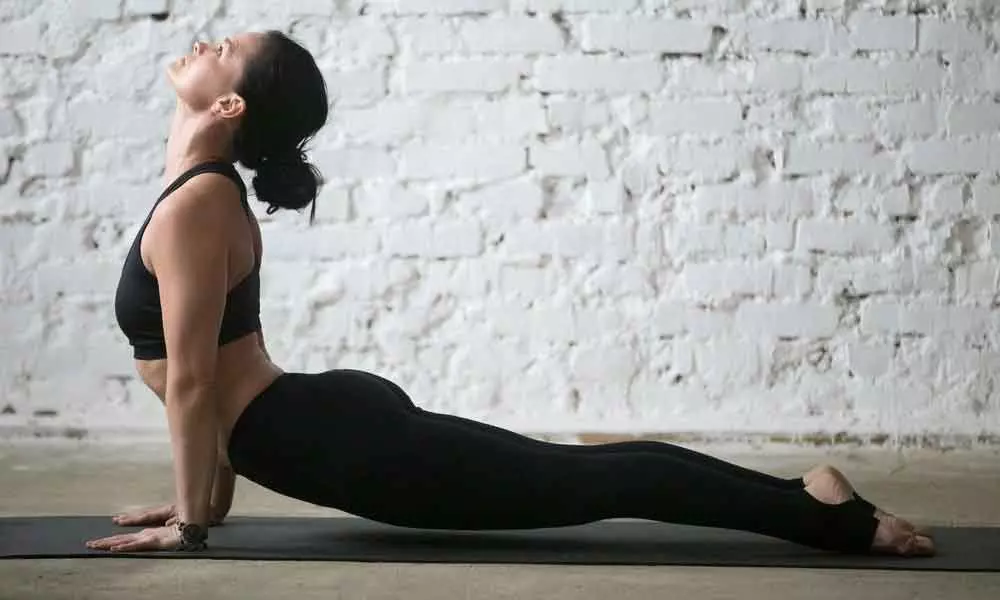Just In

Yoga derived from the word Yuj in Sanskrit means union. While the union here refers to becoming one with the divine consciousness, it is also a union with Prakriti or nature.
Yoga derived from the word Yuj in Sanskrit means union. While the union here refers to becoming one with the divine consciousness, it is also a union with Prakriti or nature. The universe is not solely for man. The cosmos witnesses the evolution of all living beings with great love. Yoga is chockfull of references to flora and fauna because it is man's responsibility to connect with nature that surrounds, supports and nourishes him. Practice the following animal postures and become the recipient of special traits or virtues that are unique to the species.
Adomukhi Swanasana (Downward Dog)
Formation of the posture
l Begin with Padahasthasana
l Move both feet backwards, lift the hips up, straighten the knees and elbows, and form an inverted 'V' shape
l Now keep the hands shoulders width apart. Fingers point ahead
l Put pressure on your palms and open your shoulder blades
l Try to push your heels to the floor
l Hold the position for 10-15 seconds.
l Keep your eye focused on your big toes
Benefits
l It stretches and gives strength to your whole body
l Helps in relieving back pain
l It rejuvenates your body
l Useful in relieving headache, fatigue and insomnia
l Tones the body muscles
l Gives strength to your legs, feet, shoulders and arms
l Reduce anxiety and depression
l By this pose your body gets a 360 degree stretch
Urdhvamukhi Svanasana (Upward Dog)
Formation of the posture
l Start by lying down flat on your stomach
l Inhale and press your palms firmly on the floor to straighten your arms and simultaneously lift your torso up and your knees off the floor
l Gently move your neck upwards to look up
l Open your shoulders sideways
l Ensure that your knees don't touch the floor
l Put pressure on your toes by curling them inwards and pressing them on the floor. Post that, extend them out
l Hold this posture for 10-15 seconds
Benefits
l Improves posture
l Strengthens the spine, arms, wrists
l Stretches chest and lungs, shoulders, and abdomen
l Improves the lung's breathing capacity
l Stimulates abdominal organs
l Helps relieve mild depression, fatigue, and sciatica
l Therapeutic for asthma
Marjari Asana (Cat)
Formation of the posture
Urdhva Mukhi Marjari Asana
l Begin with Adhomukhi Swanasana
l Lean forward and place your knees down on your mat
l Inhale, straighten your spine to form a gentle, inward curve and look up.
Adho Mukhi Marjari Asana
l Exhale, curve your spine to form a hunch of the back and allow your neck to fall.
l Focus your gaze towards your chest.
Benefits
l This asana is a good posture for relaxation
l It also mobilizes and flexes the back and neck muscles.
l It facilitates deep inhalation and exhalation.
As we imitate each posture, it is an attempt to connect with the wisdom of that particular animal or being. Yoga asanas demonstrate that the animal kingdom has so much to offer to human, and each of us in return have the capacity to reciprocate this abundance. Let us imbibe this practice of mutual love and respect both on the mat and off it.
(The writer is a philanthropist, spiritual master, lifestyle coach, yoga-preneur and author)

© 2024 Hyderabad Media House Limited/The Hans India. All rights reserved. Powered by hocalwire.com







